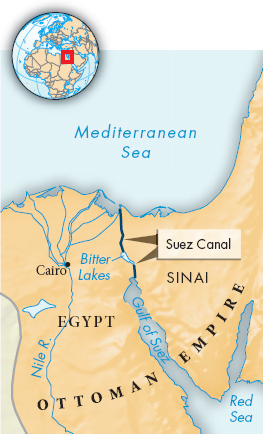Western Penetration of Egypt
Egypt’s experience illustrates not only the explosive power of the expanding European economy and society but also their seductive appeal. European involvement in Egypt also led to a new model of formal political control, which European powers applied widely in Africa and Asia after 1882.
Since 525 B.C E., Egypt had been ruled by a succession of foreigners, most recently by the Ottoman sultans. In 1798, French armies under young General Napoleon Bonaparte invaded the Egyptian part of the Ottoman Empire and occupied the territory for three years. Into the power vacuum left by the French withdrawal stepped an Albanian-
First appointed governor of Egypt in 1805 by the Ottoman sultan, Muhammad Ali set out to build his own state on the strength of a large, powerful army organized along European lines. He drafted the peasant masses of Egypt, and he hired French and Italian army officers to train both these raw recruits and their Turkish officers in modern military methods. He also reformed the government, cultivated new lands, and improved communication networks.
Muhammad Ali’s modernization program attracted large numbers of Europeans, who served not only as army officers but also as engineers, doctors, government officials, and police officers. Others turned to trade, finance, and shipping.

To pay for his ambitious plans, Muhammad Ali encouraged the development of commercial agriculture. This development had profound implications. Egyptian peasants were poor but largely self-
These trends continued under Muhammad Ali’s grandson Ismail (ihs-
Ismail’s projects were enormously expensive, however, and by 1876, Egypt owed foreign bondholders a colossal debt that it could not pay. France and Great Britain intervened and forced Ismail to appoint French and British commissioners to oversee Egyptian finances to ensure payment of the Egyptian debt in full. This momentous decision marked a sharp break with the past. Throughout most of the nineteenth century, Europeans had used military might and political force primarily to make sure that non-
Foreign financial control evoked a violent nationalistic reaction among Egyptian religious leaders, young intellectuals, and army officers. Continuing diplomatic pressure on the government, which forced Ismail to abdicate in favor of his weak son, Tewfiq (r. 1879–
The British said that their occupation was temporary, but British armies remained in Egypt until 1956. They maintained the façade of Egypt as an autonomous province of the Ottoman Empire, but the Egyptian government was a mere puppet. British rule did result in tax reforms and somewhat better conditions for peasants, while foreign bondholders received their interest and Egyptian nationalists nursed their injured pride.
British rule in Egypt provided a new model for European expansion in densely populated lands. Such expansion was based on military force, political domination, and a self-
>QUICK REVIEW
Why did global inequality intensify over the course of the nineteenth century?